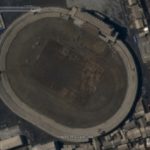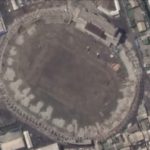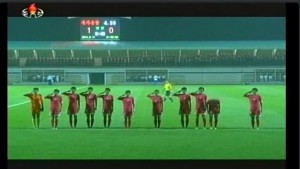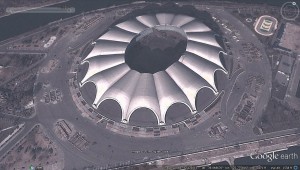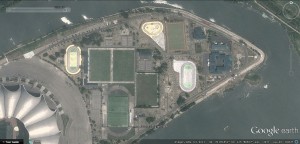UPDATE 2 (2013-12-26): A couple of the individuals involved in getting Rodman into the DPRK for his second trip (post-Vice) have written an op-ed explaining their motivation. According to the article:
Sometimes private citizens can ease tensions between governments when public officials cannot.
Since we met NBA Hall of Famer Dennis Rodman in May, we have been helping to coordinate his visits to the Democratic People’s Republic of Korea and organize an international basketball tournament sponsored by Irish bookmaker Paddy Power. Seeing as our government has branded the DPRK a “critical” national security threat, we find it reflects badly on Foggy Bottom that the three Americans best acquainted with its supreme leader are a retired NBA star, a mixed martial arts fighter and a tuba-playing human geneticist.
Mr. Rodman constantly reminds those around him to “just do one thing: Do your job.” Now it seems he is picking up some of the slack for the U.S. State Department.
Despite decades-old antagonisms, it was ultimately not confrontation but détente between the capitalist and communist blocs that brought the threat of global nuclear war to an end. Perhaps the most memorable episode of this process was President Richard M. Nixon’s visit to the People’s Republic of China and the period of Ping-Pong Diplomacy that laid the groundwork for it; USA/PRC relations were theretofore nonexistent. As Klaus Mehnert put it, the country “had been closed off so completely that there seemed to be about as many astronauts going to the moon as there were foreign observers getting into China.”
In 1967, presidential candidate Richard Nixon expressed his hope for détente with Peking, writing, “There is no place on this small planet for a billion of its potentially most able people to live in angry isolation.” On Christmas 1970, People’s Daily ran a front-page story with a photograph of Chairman Mao Tsetung and American journalist Edgar Snow standing side by side atop the Tien An Men rostrum; at the top of the page, the day’s Mao quote: “All the peoples of the world, including the American people, are our friends.” While Washington dismissed this gesture given Snow’s sympathy for Mao, in retrospect it seems it was intended as a subtle olive branch.
With spring came a chance meeting between American and Chinese ping-pong players concluding with an exchange of gifts. This simple act of humanity touched off a string of cultural and, later, diplomatic interactions.
Days later, the American team was invited to Peking. President Nixon took the opportunity to announce an easing of sanctions and his hope for normalized bilateral relations and “the ending of the isolation of Mainland China from the world community.”
Henry Kissinger’s secret visit to Peking that summer paved the way for “the Week that Changed the World.” Although Nixon and Mao certainly did not see eye to eye, their shared view that diplomacy is preferable to both isolation and war made normal relations between Washington and Peking possible.
The value of cultural exchanges consists in their power to erode misconceptions. For instance, Dr. Terwilliger spent a month this summer in Pyongyang teaching human evolutionary genetics to a class of very talented Korean undergraduates.
Aside from teaching scientific critical thinking, he took care to present his students with the best side of the American people, to demonstrate that we are a generous and friendly people rather than the “brigandish aggressors” of the familiar caricature. He was both surprised and encouraged by their interest in Mr. Rodman’s February visit.
They noted that hearing Mr. Rodman say nice things about their country made them rethink their stereotypes about Americans, for they had now seen one embracing their leader. Many had even read Mr. Rodman’s autobiography and remarked that they admired his frankness in describing the difficulties he faced in his early life.
Such reactions can only bode well. Hostility is inevitable when the common man on each side sees highlighted only the worst aspects of the other. Mutual understanding is where rapprochement starts.
While the first few timid steps may proceed slowly as trust is built, the example of Ping-Pong Diplomacy demonstrates that if the momentum is sustained it can offer governments new options with which to pursue peace and may even be developed into a full gallop (what the Koreans call “Chollima speed”) toward rapprochement. At the very least, track-two diplomacy can present unique opportunities for engagement between private citizens whose governments remain at odds.
Mr. Rodman would be the first to recognize that he is neither a politician nor a diplomat — and yet, that is precisely what makes him such a promising agent of reconciliation. As a cultural icon, Mr. Rodman has the power to project a relatable human face in a way a government functionary simply cannot: by doing down-to-earth things all people can enjoy.
Our government has repeatedly missed the basket, but at least this time Mr. Rodman is there to pick up the rebound. As he has said, “[Kim Jong Un] loves basketball. … Obama loves basketball. Let’s start there.”
An associate professor at Columbia University in New York City, Joseph D. Terwilliger was a member of Dennis Rodman’s September and December delegations to Pyongyang. John Doldo IV, a Watertown native who has also spent time in North Korea, has been working behind the scenes helping to coordinate many aspects of the project. Both authors worked on a strictly voluntary basis in order to avoid any financial conflict of interest.
UPDATE 1 (2013-12-24): According to NK News, the Irish gambling company Paddy Power has decided to end its sponsorship of Rodman’s trips to the DPRK. According to the article:
Irish betting company Paddy Power has ended its partnership with Dennis Rodman and his “basketball diplomacy” initiative.
“We have been reviewing the partnership on an ongoing basis, and with the benefit of hindsight, we probably got this one wrong,” company spokesman Paddy Power (and son of Paddy Power’s founder, Paddy Power) tells NK News.
“Circumstances have changed quite a lot in North Korea; there has been worldwide scrutiny of the North Korean regime, probably more in the past month than in the past couple of years.
“There has been almost total condemnation of North Korea worldwide, and we’re really responding to that.”
Though they won’t be involved, Rodman’s plan to bring 11 other former NBA players to Pyongyang is still a go, according to Power.
“We have spoken to Rodman’s people,” he says. “The event is apparently still happening, but we just won’t be a part of it.”
“Dennis is very appreciative of Paddy Power’s support up to this point for this historic game of basketball diplomacy taking place on Jan. 8th,” Rodman’s agent Darren Prince told the Associated Press.
Here is an article on the history of Rodman and Paddy Power.
ORIGINAL POST (2013-12-21): Dennis Rodman has made his third trip to the DPRK. Trip one post here. Trip two post here.
The organizer, Michael Spavor, has been tweeting the trip here. Based on his pics, here is the appx itinerary:
1. Arrive at night and drive to hotel (motorcade). 2013-12-19
2. Meeting with sports minister. Poto with sports minister. Meeting room. 2012-12-20
3. Dennis Rodman “leads” training for DPRK team. Game scheduled against an American team in January. Pic 1, Pic 2, Pic 3, Pic 4, Pic 5. 2012-12-20. Here is AP video of the training. Rodman is smoking a cigar.
4. Travel to Koryo Hotel for lunch. 2012-12-20
5. Travel to Korea Federation for the Protection of the Disabled. Pic 1, Pic 2, Pic 3. 2012-12-21
6. Travel to the Recuperation Center and pools at the newly renovated Munsu Water Park. Pic 1, Pic 2, Pic 3, Pic 4, Pic 5, Pic 6, Pic 7, Pic 7, Pic 8, Pic 9. 2012-12-21
7. Travel to Mirim Riding Club. Pic 1, Pic 2, Pic 3, Pic 4, Pic 5, Pic 6. 2012-12-21
Rodman and the group left the DPRK without meeting Kim Jong-un, however, I suspect that he will get together in the upcoming fourth trip slated to take place in January.
Journalists have asked Rodman about current events (Jang song-thaek, Kenneth Bae and human rights) in the DPRK, and he has responded. According to the Telegraph:
“It has nothing to do with me. I mean, whatever his uncle has done, and whoever’s done anything in North Korea, I have no control over that,” Rodman said in Beijing. “I mean, these things have been going on for years and years and years.
“I’m just going over there to do a basketball game and have some fun,” he said.
Ahead of the trip, Seoul-based North Korean human rights activist Shin Dong-hyuk said in an open letter in the Washington Post that Rodman should talk to Kim about human rights abuses in North Korea.
Rodman said it was not his place to talk about such issues.
“People have been saying these things here and there. It doesn’t really matter to me. I’m not a politician. I’m not an ambassador,” he said.
“I’m just going over there to try and do something really cool for a lot of people, play some games and try to get the Korean kids to play,” he said.
“Everything else I have nothing to do with. If it happens that he wants to talk about it then great. If it doesn’t happen I just can’t bring it up because I don’t (want) him to think that I’m over here trying to be an ambassador and trying to use him as being his friend and all of a sudden I’m talking about politics. That’s not going to be that way,” Rodman said.
Rodman is expected to provide North Korea’s national basketball team with four days of training during the trip.
Here is a video interview with Rodman at the Koryo Hotel. Here is much of what he said in the video printed in an article.
He also intends to return to Pyongyang in January with a team of fellow former National Basketball Association stars to hold basketball games on Kim’s birthday.

